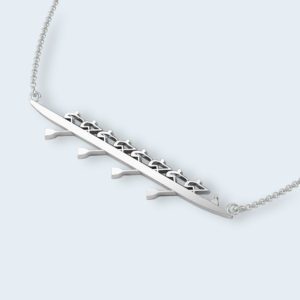This is part two of Katherine Sparks’ blog series on “The Rowing Mind – Performance Under Pressure”. Katie is an ESRC-funded sport psychology doctoral student at the University of Birmingham. She is a lover of all things rowing-related, as well as a passionate writer working to bridge the gap between academia and practice (read part one of her blog serier here). In part two she summarizes the findings of her study entitled:
The Conscious Autopilot: Rowing Performance Under Pressure
In this, my first study, I examined the possible psychological mechanisms causing some rowers to break under pressure.
According to the Reinvestment theory (Masters et al, 1993; Masters et al, 2005), athletes may have a disposition to self-focus on their motor processes (body movement) leading to a suboptimal performance under pressure as this type of self-focus disrupts their state of auto-pilot (doing actions unconsciously). I examined two types of conscious processing that are said to disrupt this auto-pilot (automaticity):
- Conscious motor processing which is where the individual consciously controls their movement and
- Movement self-consciousness where the individual is concerned about their self-presentation and movement style in relation to others.
Both of these tend to lead to a ruminating of their movement and faults etc. My study found that high levels of conscious processing such as those who were self-consciousness of their rowing style, ruminating over their movement and excessively consciously controlling their movement performed worse during their regatta race than rowers who had lower levels.
Additionally, individuals that identified to have crabbed during the race had engaged in higher levels of conscious motor processing, this is where individuals had tried to excessively overthink and consciously control their oar or body movements during their performance. Furthermore, experience/higher skill levels were also found to be linked to lower levels of movement self-consciousness and conscious processing, which suggests that high-level rowers are better at dealing with evaluative contexts, such as environments with large audiences, coaches etc. The lower levels of movement self-consciousness demonstrate that they are less worried or have learnt to deal with their self-presentational concerns of their movement style.



Whilst the lower levels of conscious processing suggest that the more experienced rowers are, the more automatic their movements are under pressure; however, I would argue they are actually in a ‘flow state’. I propose this, as the level of the rower’s expertise did not significantly change their conscious motor processing level, therefore they were still somewhat actively aware of their movement but not excessively. Flow is a mental state where the athlete has complete freedom from self-consciousness or distracting thoughts or emotions, as they are just completely immersed on the current movement/situation.
An example of being in a flow state may be when you are completely absorbed in a book you are reading, and nothing will disturb you away from that book. You may notice this state when you are rowing, and you feel in complete rhythm and unison with the boat and your crew-members, you feel as one. Recent research has supported the concept of athletes needing to be aware of their movement, so they can alter or modify the movement if the environment changes but not be consciously controlling each step-by-step process or ruminating about previous movements.
So, exactly what does this mean for you? Do you over think your movements under pressure? Do you actively try and excessively control them? Are you worried what others may think of your rowing? – especially significant others i.e. your coach, crew members, family and friends. You might, but this awareness of your movement is not always undesirable, as if tapered sufficiently it can be beneficial as you can alter and adapt your movements effectively depending on the everchanging environment.


Find out in my next blog post exactly what this awareness is and how it may be cultivated to be published next Thursday …
Katie would love your support for her scientific research! Your can partcipate in her latest study when you follow the link: https://www.smartsurvey.co.uk/s/RowMind.







